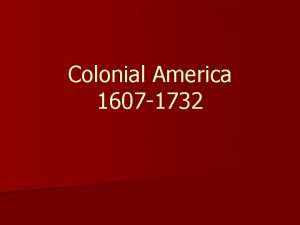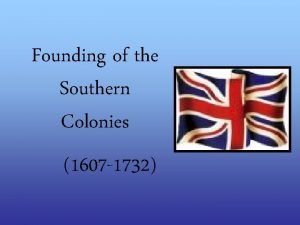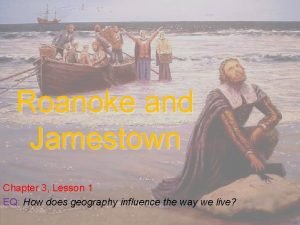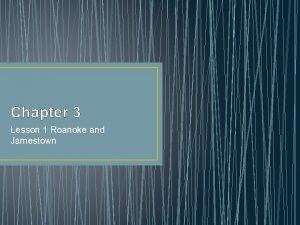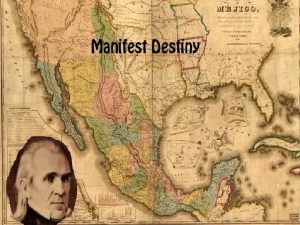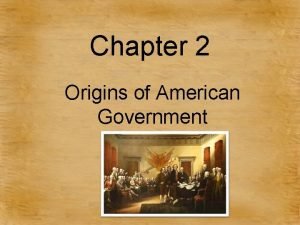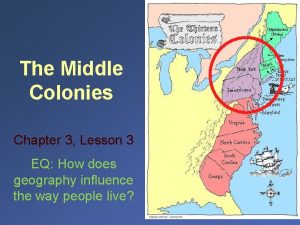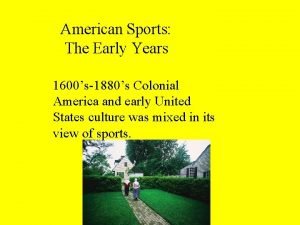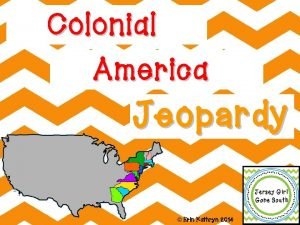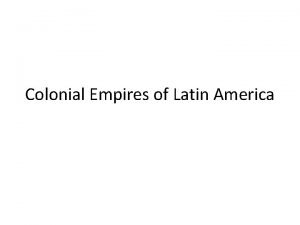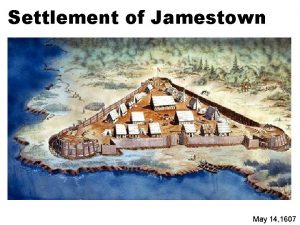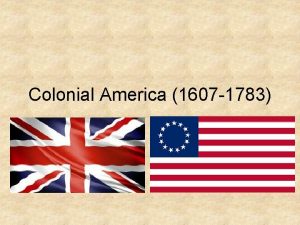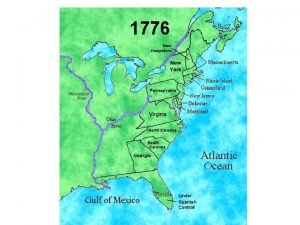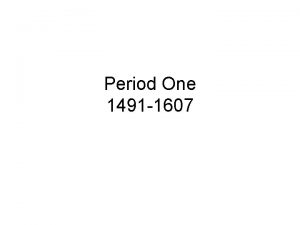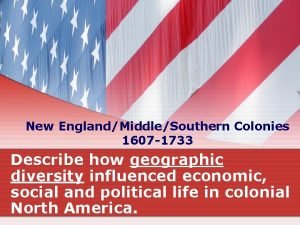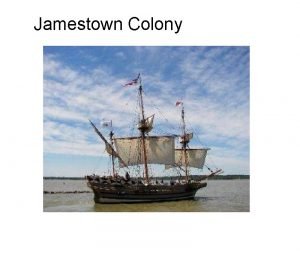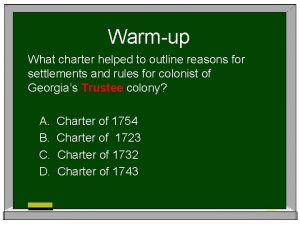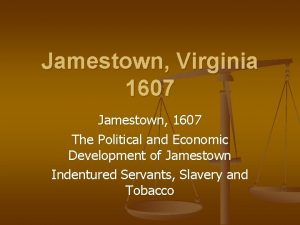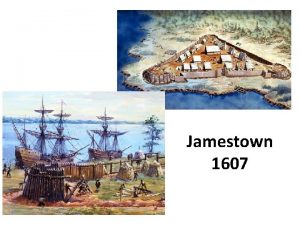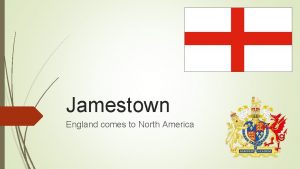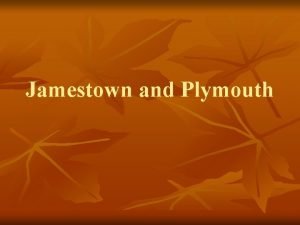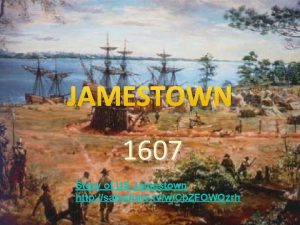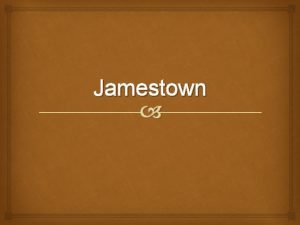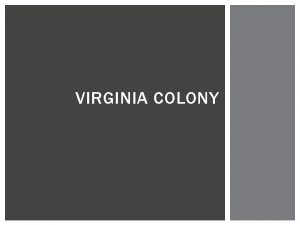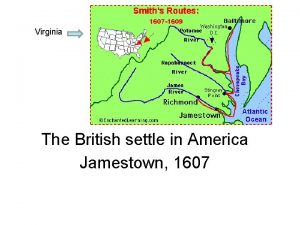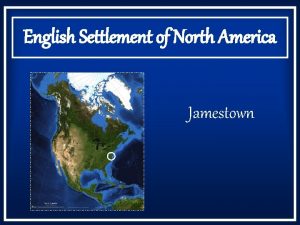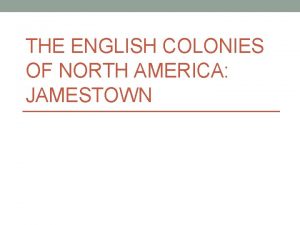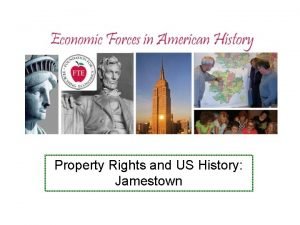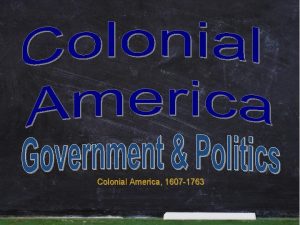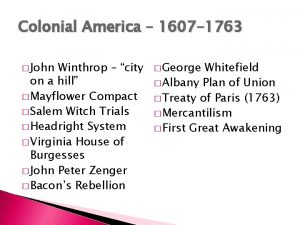Colonial America 1607 1732 History of Jamestown n




















- Slides: 20

Colonial America 1607 -1732

History of Jamestown n Established in 1607 by a groups of merchants who asked King James I for permission to establish a new colony.

Charter n Charter: a formal agreement

Settlers were Expected to: n Find gold and other valuables n Become fur and fish traders n Find a route to the Orient for trade

Captain John Smith n 27 year old explorer, soldier, and leader of the Jamestown settlement.

Hardships Settlers Endured n Soil was swampy n Food was scarce n Work was difficult n Mosquitoes carried diseases n Lacked good farmland n Suffered attacks from the Native Americans


Reasons To Move to the “New World” n Religious Freedom n Persecution (death) by the King n Jobs n Land n Farming n Economci opportunities (money)

n The 13 colonies were divided into three groups: n New England colonies (northern colonies) n Middle Colonies n Southern Colonies

n Many northern colonists came to the New World in search of a separation of government and the Church.

n The Middle Colonies attracted the most diverse number of European ethnic groups

n By the mid 1700 s there were more Africans living in some southern colonies than Europeans or Native Americans.

n In 1700 there were 25, 000 people living in the 13 colonies. By 1775 the population had grown to about 2. 5 million.

n To symbolize the 13 colonies, the Great Seal of the United States features an eagle and 13 olive leaves, olives, arrows, and stars. The seal is now on the back of the dollar bill.

Colony Massachusetts 1620 Origin of Name Chief Producers “Near the Great Farming (corn & cattle), fishing, Hill” lumbering, shipbuilding New Hampshire 1622 Country of Hampshire England Connecticut 1633 “On the long tidal river” Rhode Island “Red Island” Farming potatoes), fishing, textiles, shipbuilding Farming (corn &wheat) fishing Farming (cattle & dairy) fishing,

Colony Origin of Name New York 1624 Duke of York Delaware 1638 Delaware tribe New Jersey 1664 Pennsylvania 1682 Chief Producers Farming cattle, rice, indigo, wheat), ironworks shipbuilding Fishing & Lumbering Isle of Jersey in Ironworking & England lumbering William Penn Farming (cattle & dairy) papermaking & textiles

Colony Origin of Name Virginia (1607) Elizabeth of England Maryland Chief Producers Farming (corn, tobacco, wheat) Queen Henrietta Farming (corn, Maria of England tobacco, indigo, wheat) shipbuilding Carolina (1663) Charles I of England Farming (rice, indigo, tobacco) North Carolina South Carolina Georgia (1732) King George II Farming (indigo, rice, sugar) of England

Northern Style Colonial Homes

Middle Style Colonial Home

Southern Style Colonial Homes
 1732-1607
1732-1607 Carolina charter of 1663
Carolina charter of 1663 Colonial america lesson 1 roanoke and jamestown
Colonial america lesson 1 roanoke and jamestown Colonial america lesson 1 roanoke and jamestown
Colonial america lesson 1 roanoke and jamestown Blood on the river jamestown
Blood on the river jamestown Expansion of the united states of america 1607 to 1853 map
Expansion of the united states of america 1607 to 1853 map Sports in colonial america
Sports in colonial america Origins of american government chapter 2
Origins of american government chapter 2 Lesson 3 the middle colonies answer key
Lesson 3 the middle colonies answer key Early american games
Early american games Colonial america final jeopardy
Colonial america final jeopardy Colonial america jeopardy
Colonial america jeopardy Colonial empires in latin america
Colonial empires in latin america 1607:4
1607:4 May 14 1607
May 14 1607 1783-1607
1783-1607 1776-1607
1776-1607 1491 to 1607 timeline
1491 to 1607 timeline Middle colonies
Middle colonies Jamestown king james
Jamestown king james Charter of 1732 document
Charter of 1732 document
